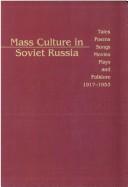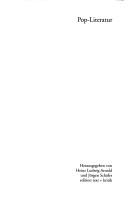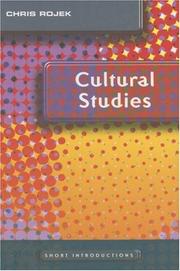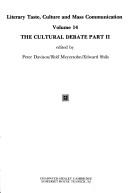| Listing 1 - 10 of 215 | << page >> |
Sort by
|
Book
ISBN: 9781783484379 9781783484362 Year: 2016 Publisher: London ; New York : Rowman & Littlefield International,
Abstract | Keywords | Export | Availability | Bookmark
 Loading...
Loading...Choose an application
- Reference Manager
- EndNote
- RefWorks (Direct export to RefWorks)
"Explores the memories generated and histories constructed by the transnational circulation of popular media texts amongst East Asia and between East and Southeast Asia. It looks at the impact of nostalgia and heritage within popular culture over the decades"--
Popular culture --- Mass media --- Culture populaire --- Médias --- Médias
Book
ISBN: 1457197480 1607324180 9781607324188 9781607324171 1607324172 Year: 2016 Publisher: Logan
Abstract | Keywords | Export | Availability | Bookmark
 Loading...
Loading...Choose an application
- Reference Manager
- EndNote
- RefWorks (Direct export to RefWorks)
"Folkloresque introduces a new concept to explore the dynamic relationship between folklore and popular culture. Folkloresque describes the phenomenon were folklore is vaguely referenced for its power to connect beyond a product--tropes in the domain of popular culture that deploy folkloristic themes but outside academic folklore."-- "This volume introduces a new concept to explore the dynamic relationship between folklore and popular culture: the "folkloresque." With "folkloresque," Foster and Tolbert name the product created when popular culture appropriates or reinvents folkloric themes, characters, and images. Such manufactured tropes are traditionally considered outside the purview of academic folklore study, but the folkloresque offers a frame for understanding them that is grounded in the discourse and theory of the discipline.Fantasy fiction, comic books, anime, video games, literature, professional storytelling and comedy, and even popular science writing all commonly incorporate elements from tradition or draw on basic folklore genres to inform their structure. Through three primary modes--integration, portrayal, and parody--the collection offers a set of heuristic tools for analysis of how folklore is increasingly used in these commercial and mass-market contexts.The Folkloresque challenges disciplinary and genre boundaries; suggests productive new approaches for interpreting folklore, popular culture, literature, film, and contemporary media; and encourages a rethinking of traditional works and older interpretive paradigms. Contributors: Trevor J. Blank, Chad Buterbaugh, Bill Ellis, Tim Evans, Michael Dylan Foster, Carlea Holl-Jensen, Greg Kelley, Paul Manning, Daniel Peretti, Gregory Schrempp, Jeffrey A. Tolbert "--
Folklore in popular culture. --- Folklore. --- Popular culture. --- Folklore and the Internet. --- Folklore --- Folklore dans la culture populaire. --- Culture populaire. --- Folklore et Internet. --- Structural analysis. --- Analyse structurale.

ISBN: 0253209692 0253328934 Year: 1995 Publisher: Bloomington Indiana University Press
Abstract | Keywords | Export | Availability | Bookmark
 Loading...
Loading...Choose an application
- Reference Manager
- EndNote
- RefWorks (Direct export to RefWorks)
Popular culture --- Culture populaire --- Soviet Union --- URSS --- Civilization --- Civilisation --- Popular culture - Soviet Union. --- Soviet Union - Civilization.
Book
ISBN: 9782130816348 2130816347 Year: 2019 Publisher: Paris : Presses Universitaires de France,
Abstract | Keywords | Export | Availability | Bookmark
 Loading...
Loading...Choose an application
- Reference Manager
- EndNote
- RefWorks (Direct export to RefWorks)
Pop'philosophie » : s'il fallait se fier aux crises d'urticaires ou la morgue méprisante que ce simple mot provoque, il faudrait sans doute en conclure qu'il s'agirait du nom d'une étrange maladie. Cette maladie, ce serait celle de la philosophie qui se prostituerait au spectacle ou aux industries culturelles, à la pop-culture ou, pire, aux sirènes du populisme. Avec la pop'philosophie, ce à quoi on assisterait serait la ruine de la philosophie tout court, devenue tantôt gadget pédagogique pour enseignants désespérés, tantôt tentative un peu pathétique de capitaliser sur la glamour frelaté du monde du rock, du cinéma ou de la télévision pour ressasser les banalités les plus éculées. Et si c'était faux ? Pour Gilles Deleuze, en tout cas, qui inventa ce concept au milieu des années 1970, ça l'était : à ses yeux, rien n'était plus important que l'invention d'une pop'philosophie qui sauverait enfin la pensée en général de la double tentation de la correction professorale ou de la pontification esthétique. Permettre d'inventer une pensée véritablement anarchiste, enterrant la philosophie pour l'ouvrir à des devenirs inédits : tel était l'objectif qu'il donna au concept de pop'philosophie. Rien n'était moins simple – ni plus ambitieux. Il est temps de comprendre en quoi.
Philosophie (IDREF)027295206 --- Philosophie --- Dans la culture populaire. --- Réforme. --- Deleuze, Gilles --- Critique et interprétation.
Book
ISBN: 2760333817 9782760333819 2760333809 9782760333802 Year: 2021 Publisher: Ottawa
Abstract | Keywords | Export | Availability | Bookmark
 Loading...
Loading...Choose an application
- Reference Manager
- EndNote
- RefWorks (Direct export to RefWorks)
"Voyages en nostalgie explore un corpus de productions culturelles et artistiques choisies en fonction de leur pouvoir évocateur et de leur capacité à faire ressurgir des moments privilégiés grâce à des lectures, des musiques, des publicités, des fictions télévisuelles, des films et des jeux vidéo. Si notre existence est faite de rencontres avec des personnes en chair et en os, elle est également modelée par d'innombrables rencontres virtuelles, médiatisées par les propositions artistiques que leurs auteurs soumettent à notre attention. À travers celles-ci, nous construisons notre identité. Nous apprenons à vivre et à nous connaître en découvrant plusieurs visions du monde. Certaines créations éveillent spontanément des émotions liées à nos expériences personnelles. D'autres se déposent dans notre inconscient, prêtes à surgir de façon inattendue ou à la suite d'un travail volontaire d'excavation des souvenirs et d'exercice de la mémoire. Elles constituent des écrans sur lesquels nous nous projetons et des tremplins favorisant l'exercice de notre propre expression. Voici un texte hybride dans lequel le ton alterne entre le registre de l'érudition et celui plus intimiste des réminiscences qu'elles suscitent chez le sujet qui les reçoit. À chacun ses nostalgies..."--
Culture populaire --- Arts --- Aspect psychologique. --- Nostalgie. --- arts. --- identité. --- media. --- memory, identity, art. --- médias. --- mémoire. --- nostalgia.
Book
ISBN: 9782503549835 9782503549910 2503549837 2503549918 Year: 2014 Volume: 33 Publisher: Turnhout Brepols
Abstract | Keywords | Export | Availability | Bookmark
 Loading...
Loading...Choose an application
- Reference Manager
- EndNote
- RefWorks (Direct export to RefWorks)
Throughout the medieval period, the popular classes were always reckoned as a potential force in society even though it was usually dangerous for them to articulate divergent social, political and religious opinions. Sources on medieval political and social life seem to show us a world of order, acquiescence and consent. Otherwise, they reveal a picture of bloodshed and violent strife. During times of intense conflict, however, the human tongue was always the most frequently used weapon, much more so than the sword or the dagger. The vox populi, though often difficultly retrievable in the sources, was a ubiquitous one within the realm of later medieval politics. The essays collected in this volume deal with such speech acts of political rebels, with political languages of the 'popular classes' in medieval society but also with the subversive twists to speech situations such as preaching, mockery and insults
History of Europe --- anno 1200-1499 --- Culture politique --- --Culture populaire --- --Europe --- --Moyen âge, --- Politique et gouvernement --- --Classes populaires --- Langage politique --- --History of Europe --- Classes populaires --- Political culture --- History. --- Culture populaire --- Moyen âge, 476-1492 --- Europe

ISBN: 3883777358 Year: 2003 Volume: 10 Publisher: München Text und Kritik
Abstract | Keywords | Export | Availability | Bookmark
 Loading...
Loading...Choose an application
- Reference Manager
- EndNote
- RefWorks (Direct export to RefWorks)
Was ist Pop eigentlich? Nach welchen Kriterien werden Pop-Elemente und Literatur zusammengebracht? Der Sonderband versucht den Begriff der "Pop-Literatur" mit Blick auf seine Herkunft und auf Autoren verschiedener Generationen schärfer zu fassen und die Tradition von Schreibweisen zu untersuchen, die ohne Impulse der Pop-Kultur nicht denkbar wären.
Sociology of literature --- German literature --- Popular literature --- Popular culture in literature. --- Littérature allemande --- Littérature populaire --- Culture populaire dans la littérature --- History and criticism. --- Histoire et critique --- Littérature allemande --- Littérature populaire --- Culture populaire dans la littérature --- Pop'art.

ISBN: 0745636845 0745636837 9780745636849 9780745636832 Year: 2007 Publisher: Cambridge Polity
Abstract | Keywords | Export | Availability | Bookmark
 Loading...
Loading...Choose an application
- Reference Manager
- EndNote
- RefWorks (Direct export to RefWorks)
Culture --- Popular culture --- Culture populaire --- Culturele studies. --- Study and teaching. --- Sociological aspects. --- Culture. --- Popular culture. --- Philosophy and psychology of culture

ISBN: 0914146564 0914146572 Year: 1980 Volume: 13-14 Publisher: Cambridge Chadwyck-Healey
Abstract | Keywords | Export | Availability | Bookmark
 Loading...
Loading...Choose an application
- Reference Manager
- EndNote
- RefWorks (Direct export to RefWorks)
Mass media --- Popular culture --- Médias --- Culture populaire --- Social aspects --- History --- Aspect social --- Histoire --- Sociology of culture
Book
ISBN: 9780822351115 9780822350972 Year: 2011 Publisher: Durham : Duke university press,
Abstract | Keywords | Export | Availability | Bookmark
 Loading...
Loading...Choose an application
- Reference Manager
- EndNote
- RefWorks (Direct export to RefWorks)
A relation of cruel optimism exists when something you desire is actually an obstacle to your flourishing. Offering bold new ways of conceiving the present, Lauren Berlant describes the cruel optimism that has prevailed since the 1980s, as the social-democratic promise of the postwar period in the United States and Europe has retracted. People have remained attached to unachievable fantasies of the good life-with its promises of upward mobility, job security, political and social equality, and durable intimacy-despite evidence that liberal-capitalist societies can no longer be counted on to provide opportunities for individuals to make their lives "add up to something." Arguing that the historical present is perceived affectively before it is understood in any other way, Berlant traces affective and aesthetic responses to the dramas of adjustment that unfold amid talk of precarity, contingency, and crisis. She suggests that our stretched-out present is characterized by new modes of temporality, and she explains why trauma theory-with its focus on reactions to the exceptional event that shatters the ordinary-is not useful for understanding the ways that people adjust over time, once crisis itself has become ordinary. Cruel Optimism is a remarkable affective history of the present.
Popular culture --- Optimism --- Progress. --- Philosophical anthropology --- Culture populaire --- Optimisme --- Progrès --- Conditions sociales --- Progress --- Social conditions --- Progrès
| Listing 1 - 10 of 215 | << page >> |
Sort by
|

 Search
Search Feedback
Feedback About UniCat
About UniCat  Help
Help News
News